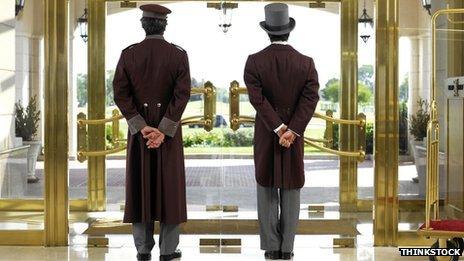Living wage: What about jobs?
- Published

It's Living Wage week. The cause has been well aired, with companies signing up. It's been well debated too, except that there isn't much of a debate.
A wage based on what people need in order to live a decent life is hard to argue against. And at £7.85 (£9.15) it's not for fat cats.
Moving up to a Living Wage seems not just to be a matter of decency and fairness. For recruitment, it's a good way to make your company look an attractive place to work.
Its adoption makes sense by making the lower-paid workforce less reliant on the subsidy of employment through tax credits.
It also has the capacity to pump more money into consumers' pockets, and that's generally seen as A Good Thing for the economy.
Indeed, it's asked why shouldn't the national minimum wage be raised to the level of the living wage? What kind of law leaves so many workers earning less than they need?
Labour flexibility
There is one obvious answer: jobs. The £6.50 hourly rate for the minimum wage (if you're 21 or over - it's as low as £2.73 if you're an apprentice) is designed to support the low paid, but not hurt employment.
Or, as the Low Pay Commission puts it (with the recommendations it sends to Whitehall), it's "to help as many workers as possible, without harming employment prospects".
It was strenuously argued before 1997 that the introduction of a minimum wage would hurt jobs. There aren't many arguing that now, which either means the Low Pay Commission has been pitching the minimum wage about right, or something else has been helping the labour market. Economic growth and increased labour flexibility spring to mind.
But what about the impact the Living Wage might have on jobs? The companies which have signed up are overwhelmingly dependent on skilled staff, usually earning well above both thresholds. Signing up isn't much of a challenge for them, though it's pointed out that a quarter of minimum wage workers are not in low-pay sectors.
But it's a different matter if you're in the caring, catering and cleaning business, and competing for contracts. Or in hospitality - changing beds and pulling pints.
Hotel check-in
Some research has been carried out for the British Hospitality Association, feeding into an Ipsos Mori study commissioned by the Scottish government. It's not been published yet - not by the Scottish government, anyway. It has, however, been submitted to the Smith Commission on increased devolved powers for Holyrood.
This is a small sample, but is meant to illustrate what the Living Wage would mean for small hotel businesses.
Asking five such firms, covering 14 differing hotels, they measured the rise in payroll costs to bring everyone up to the Living Wage, and then added the likely pressure from more senior staff to protect their differentials (be honest: you'd want to if it were you).

The result was a 10% rise in costs with the simple first scenario, or 17% if differentials are maintained.
Assuming that wages take up 30-33% of a hotel's costs, then that's a 5%-6% rise in total costs. And it's pointed out that unless customers are willing to absorb that ("unlikely in the current environment"), then it's a hit on profits, investment and/or jobs.
"While hotels would be reluctant to reduce headcount, as customers would suffer, this may be an inevitable consequence," the Scottish Tourism Alliance has told the Smith Commission.
"Hotels are likely, at least, to thoroughly review staffing levels, review staff hours, shift full-time posts to part-time posts, or reduce employment of young/inexperienced staff."
It goes on to argue that hotels may remove staff benefits, such as free meals while working, or investment in training. It claims that rural hotels, or those more dependent on food and drink than on accommodation would suffer more, and that bank covenants could be broken.
Now, this is only a small sample. It's intended to sound alarming. And it probably echoes the 1990s campaign against the minimum wage. But it's a reminder that doing what might seem right and fair isn't always easy.
And as the Smith Commission is finding, there's a lot of strenuous lobbying going on, much of it from business groups wanting to protect themselves and stop things changing through further devolution. More on that soon.